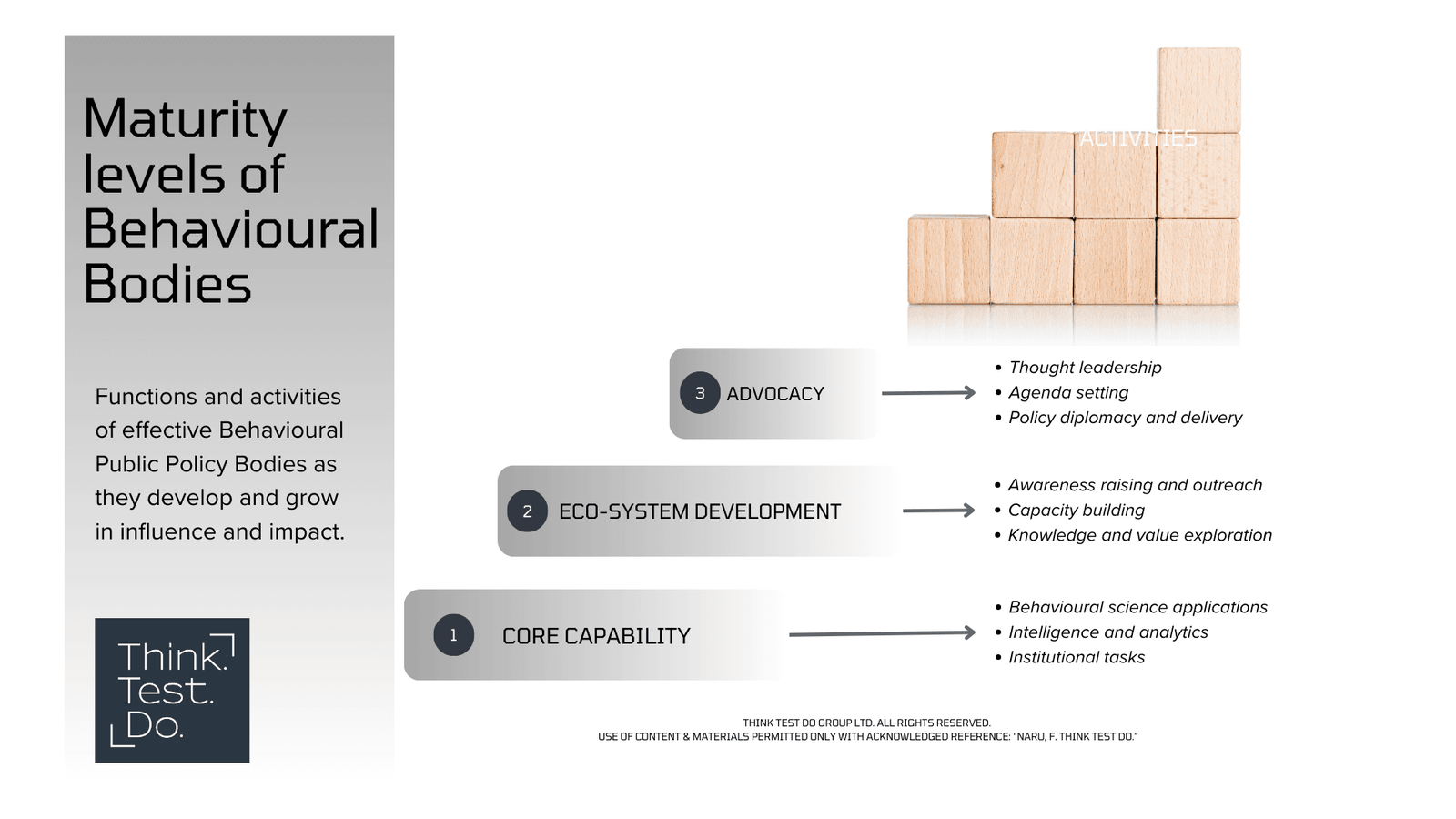Latest
Insights
- Insights
Growing up: Maturity levels of Behavioural Bodies (#Teams)

Behavioural science capacities are increasingly being used in the public and private sector organisations. This often involves establishing a team, unit or body whose role is to “apply behavioural science”. But what does that mean? And how does that evolve over time?
In our experience, successful behavioural bodies have three functions that are developed and enhanced as the body matures as a capacity within an organisation. The three levels of maturity are not only from our experience in setting up and advising behavioural bodies, but also on setting up and operating new or innovation-driven initiatives within public and private sector organisations. New initiatives and their good work sometimes fade away or do not achieve their full potential as they have not deliberately planned for growth and impact. We have developed and use this framework with partners we work with to help them deliver results.
The first level is the core capability. For behavioural capacities this is often doing activities that directly apply traditional behavioural science tools. This can be designing or inputting into communications, testing and rolling out interventions and experimenting or conducting research. The core function of some bodies is more focussed on providing internal or corporate intelligence and analytics and making sense of data and information in the organisation for decision-makers. This is especially the case inside the private sector. Finally as part of a larger entity, there are always institutional tasks of management, budgeting, briefing and operating that can be time-consuming especially for the leaders in the behavioural body. However these are not always appreciated, but are important for operations and mainstreaming.
Staying at this level does not achieve the full benefit of using innovative methods, such as behavioural science.
The next level, is to actively develop the eco-system that the behavioural capacity will be living within. Providing awareness raising and outreach activities is important for bodies to create and maintain critical relationships. Mainstreaming the use of behavioural science also requires capacity building of partners and stakeholders. Continuing to be curious and exploring avenues for generating knowledge and value is vital to being at the forefront of many of the issues and problems that the behavioural body is contributing to address.
The third level that builds on the two other functions is advocacy. By using the outputs of the core function and the eco-system development, the behavioural body can be in the position to help set the agenda and priorities for the organisation, and or others that are involved in actions that are mission-related. The body can also leverage its work to be engaged in thought leadership, using its insights, to add value to the eco-system. This is especially the case where the actions and decisions of other entities impact upon institutional outcomes. For instance this may include delivery partners. By using the outputs of all of its work it can contribute to policy diplomacy and shaping the delivery of policies for better outcomes.
While the foundations of operating a behavioural or innovation team, are often focussed on “doing the behavioural science or innovation”, this does not translate to being successful. Rather success is as much about knowing how you will use your outputs and nurturing routes to results. This model has been used to provide decision-clarity and assist those working in behavioural and innovation bodies to be more effective not only in the immediate future, but more importantly in the medium to long term, for their own institutional longevity.

*Source and Further Reading:
Naru, F. (2020). Behavioural Organisations: 4 key lessons for mainstreaming BI, apolitical. https://apolitical.co/solution-articles/en/behavioural-organisations-4-key-lessons-for-mainstreaming-bi
Naru, F., Papa, F., Nakagawa, J. (2021). Shaping change in organisational culture in the public sector: Lessons from behavioural science – Chapter 8, Report on Changing Mindsets to Realize the 2030 Agenda for Sustainable Development (United Nations). https://unpan.un.org/sites/default/files/d8-files/Changing%20mindsets%20report%20-%20chapter8.pdf
Naru, F. (2024). Behavioral public policy bodies: New developments & lessons. Behavioral Science & Policy, 10(1), 1-17. https://doi.org/10.1177/23794607241285614 (Original work published 2024)
